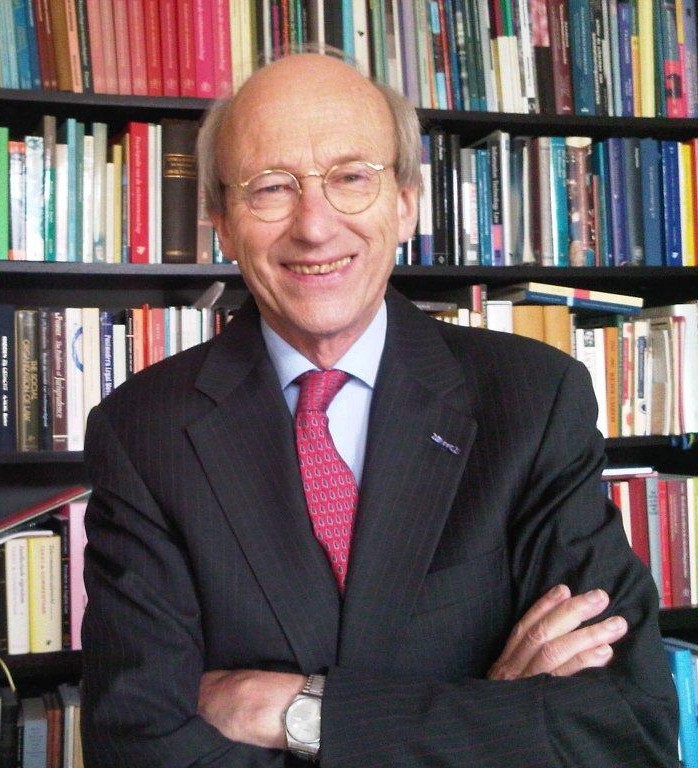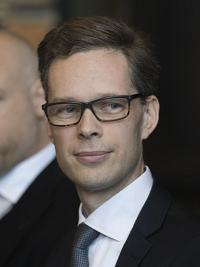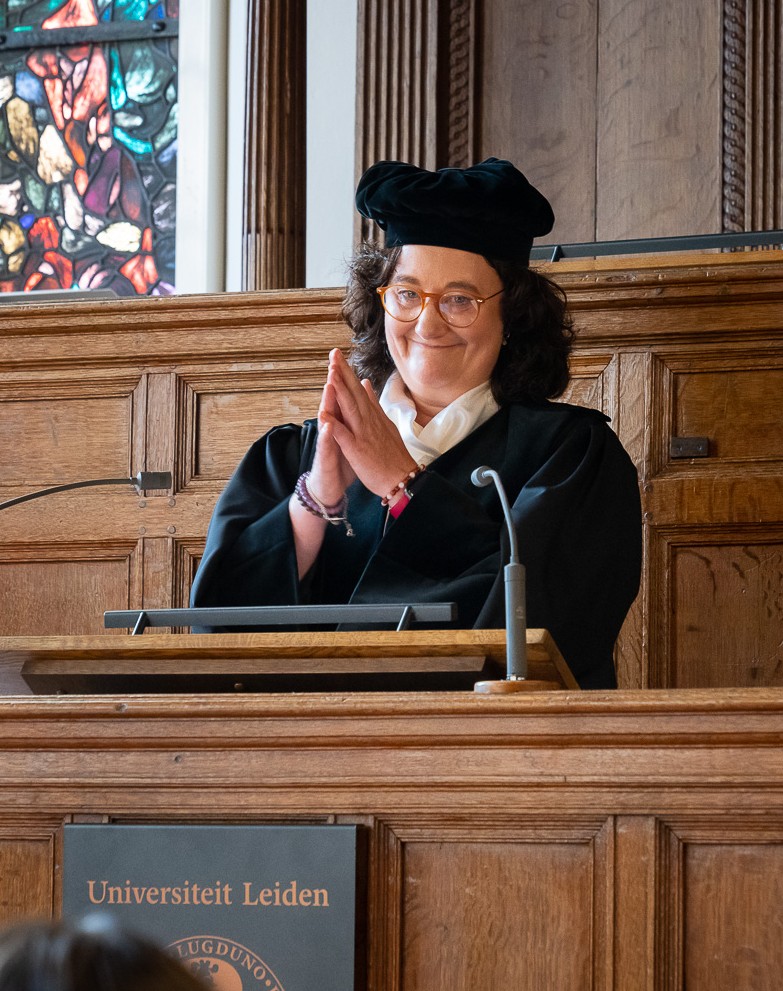
Four decades of eLaw: computer science hand-in-hand with law
Research and education at the intersection of law and technology is more important than ever. With its 40 years of experience, the eLaw department, founded in 1985, is ready for the future. Time to reflect on four decades of innovation.
The department was a first in the Netherlands: one of the first academic institutes to focus specifically on the intersection of computer science and law. It all started with Aernout Schmidt and Hans Franken.

Hans Franken
In 1973, I was honoured to deliver my inaugural lecture as Professor of Introduction to Law in Rotterdam (EUR). The title was 'Maat en regel' (Measure and rule). By this I meant that lawyers – especially judges – not only explain rules or laws, but also measure or explain human behaviour on the basis of equality or the degree of difference. This is where computers could help.
The possibilities of the computer
Ever since his inauguration in 1973, Hans Franken saw the potential of computer science in law. ‘The computer enabled comparing large numbers of court rulings and establishing models for new cases. I explicitly didn’t want to design a robot judge, but to make models that would meet the requirements of equal treatment. In 1977, Franken was appointed Professor of Introduction to Law. In the early 1980s, the course Law and Computer Science was set up by initiator Aernout Schmidt. The course was developed in collaboration with other passionate individuals, including Franke van der Klaauw, Corien Prins and Jaap Hage. Franken was also involved and officially included the course in his remit in 1987.
Gera van Duijvenvoorde, currently Professor of Telecommunications Law, was one of the young students fascinated by this new course: ‘I knew early on that I wanted to take the new Law and Computer Science elective because I thought that’s where the future lies.' It turned out to be a wise choice: Van Duijvenvoorde became a student assistant, acquired a PhD position and in 2013 became a professor at the eLaw department. 'Law and Computer Science and eLaw have been very important for my development and future. From the very beginning, the staff were truly committed, open to developments in practice, and great at coaching young researchers,' says the professor. ‘I was part of an eLaw family.’
In the early 1990s, the brand-new field received a tremendous boost as national research projects were launched. ‘A large amount of research funding became available and there was also a huge amount of output: from the seven faculties that gradually emerged across the country, more than 140 books were published, of which around 30 were dissertations,’ says Franken. ‘The Department of Law and Computer Science (now eLaw) was in the thick of it.’

Gera van Duijvenvoorde
'The interdisciplinary and international character of eLaw is indispensable when it comes to preparing students for their role as lawyers in the field. They will be challenged to think beyond legal frameworks and to include in their analyses matters like ethical aspects related to AI, geopolitical issues, security, and market power.'
Foresight
According to Bart Custers, Professor of Law and Data Science and head of department at eLaw, the department was founded with foresight: ‘Back then, the thinking already existed that we could use computers to recognise patterns in court cases or even make predictions. That was not technologically possible at that time, but now it largely is. And it’s actually occurring.' One example is the use of AI models such as ChatGPT by judges or lawyers. It’s a development that raises complex issues, not only about law and technology, but also about ethics and the effects on society.

Bart Custers
'Tools like ChatGPT are already an integral part of our lives, even though they’ve only been around for a few years. So many aspects are involved – just think of the legal aspects alone. We haven't figured all that out yet. For instance, what about the intellectual property of what you generate, what about liability if the data is incorrect, if the tool shows a pattern that is discriminatory, who’s responsible?'
The professor argues that it was clear early on that the department would not be exclusively legal in nature. 'From the beginning, it was said, “We need people from different backgrounds.” Now we have a very broad team. Not only do we have lawyers, we also have tech-savvy staff, philosophers, ethicists, social scientists. In short: people who can really examine these issues from various perspectives.'
eLaw in education
As a field, digital law has been constantly evolving over the past 40 years. This has made eLaw flexible, says Simone van der Hof, Professor of Law and Digital Technologies: ‘Our staff are used to keeping up with technological developments. The fact that the field continues to evolve so fast is something everyone just really enjoys. It means you’re constantly facing new challenges.'

Simone van der Hof
'In 1995, when I’d just graduated, we were very optimistic. We saw the internet becoming big and we thought: this is going to change the world. But, on the whole, we viewed it in a very optimistic, positive way. Now, of course, we see that there are also many concerns, and that we really need all those laws and regulations, which are constantly expanding. Making sure that people and our public values are protected, and that technology is developed that leads to responsible use: that’s something that’s incredibly important.'
This continuous change and adaptation also manifests itself in the education the department offers. One outstanding example of this is the Advanced Master Law and Digital Technologies: ‘Our research is very much intertwined with the master's programme,’ says Van der Hof. ‘Unfortunately, we have to make choices in what we offer, because the field is so vast that we can’t cover everything.’ For the professor, the introduction of the Advanced Master programme is one of the most important milestones over the past 40 years. 'One of the first things I did when I came to work here in 2011 was to commit to developing a master's programme. It’s great for me to see that it’s become such a huge success story.'
The next 40 years
While 40 years ago the introduction of computers led to entirely new applications, today new issues lie ahead. For example, what are the legal implications of using AI in the military domain, or how do we deal with discriminatory algorithms in recruitment procedures? Lawyers themselves will also increasingly be applying AI – how will students be prepared for this?
'We aim to teach students how to use these tools properly. Just like a calculator: you can use it to do maths, but you won't pass an advanced maths exam with it,' says Custers. 'If you want to educate students properly, you have to teach them to become critical thinkers. For instance, where does all the information that reaches them come from? How is it shaped, and who has an interest in adding “colour” to it? Not only that, they need to come out of their bubble, and consider contrasting information. That’s partly the task of a university: to be a place where you can criticise each other and ask, “is that really true?”'
Every year, the eLaw department organises the Hans Franken Lecture, in honour of one of its founders, Hans Franken. This year, the lecture was extra special because it coincided with the 40th anniversary conference on 2 April. Marietje Schaake, privacy expert, cyber critic and politician for the Dutch social liberal and progressive party D66, was the keynote speaker. The reason for the lecture was her book The Tech Coup, which was published last year.
The Faculty Board congratulates eLaw
eLaw celebrating its 40th anniversary this year is a remarkable milestone. When the department was founded in 1985, it was the first in the Netherlands to focus on law and technology. So, eLaw was far ahead of its time and has put Leiden Law School on the map in terms of its research and teaching in recent years.
The Faculty Board warmly congratulates the department and the institute on this unique anniversary. We are proud of the wonderful anniversary conference that took place yesterday and look forward to all upcoming developments and collaborations involving our eLaw staff.
